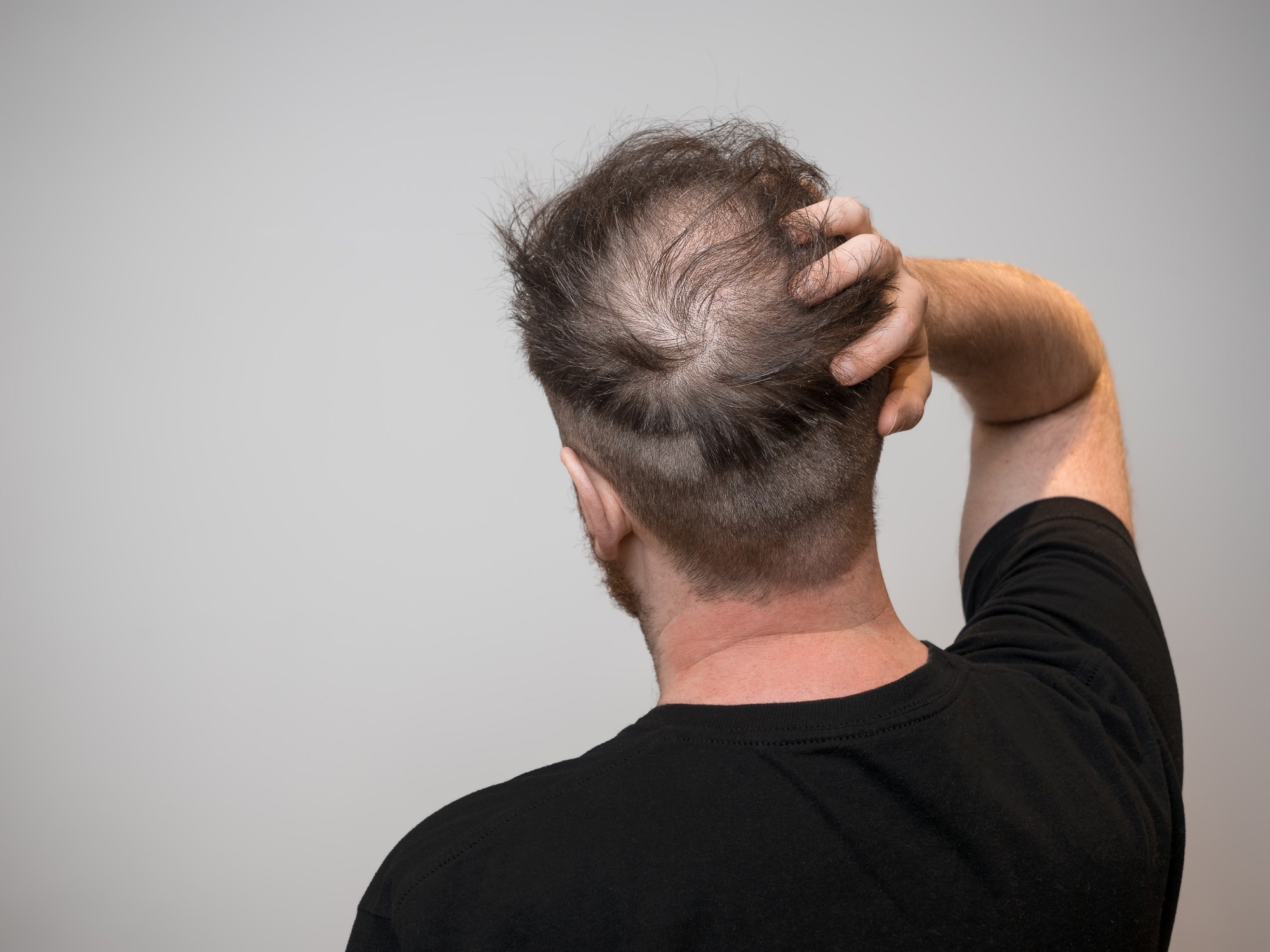New research shows how everyday dietary choices, from vitamin D and iron to sugary drinks and alcohol, can tip the balance between healthy hair growth and increased risk of hair loss.

Assessing the relationship between dietary factors and hair health: A systematic review. Image Credit: Chris Curry / Shutterstock
In a recent study in the journal Nutrition and Health, researchers synthesized evidence from 17 peer-reviewed publications, collectively leveraging more than 61,332 participants, to unravel the science on dietary impacts on hair health.
Review findings highlight that vitamin D concentrations demonstrated a strong inverse correlation with alopecia (hair loss) severity, providing an example of the importance of specific micronutrients in optimal hair health, although one large cohort study found no association. Conversely, the high consumption of sugary drinks (>3500 ml/week) was positively correlated with hair loss, particularly in men.
These findings underscore the critical role of nutrients and specific foods and supplements, rather than broad dietary patterns, in maintaining hair follicle wellbeing.
Background
Evolutionary biologists have established hair as more than just a biological feature, but as a secondary sexual trait deeply tied to an individual’s identity, self-esteem, and psychological well-being. Alopecia (hair loss) is a globally common and distressing condition affecting millions of people across all ages, races/ethnicities, and genders.
While a growing body of evidence highlights the roles of genetics and hormones in alopecia and general hair follicle health, emerging evidence suggests the profound influence of diet and nutrition in optimal hair (and by extension, psychological) outcomes.
Severe nutrient deficiencies are now proven to trigger hair loss, but the role of more subtle dietary factors and specific nutrients in the generalizable human population remains unclear. Previous reviews investigating these topics often focused on alopecia, leaving a gap in scientific understanding of relationships between diet and broader measures of hair health (e.g., quality, density, and growth).
Understanding these relationships would not only allow consumers and nutritionists to make more informed choices about their dietary plans but would also enable public health agencies and psychologists to potentially mitigate today’s growing mental health crisis.
About the study
The present systematic review aims to address these pressing needs by providing a comprehensive and up-to-date overview of the scientific literature, collating and synthesizing this evidence to guide individuals and healthcare professionals on optimal diet-associated hair health decisions.
The review was conducted according to Preferred Reporting Items for Systematic Reviews and Meta-Analyses (PRISMA) guidelines and was registered on the PROSPERO platform. It comprised an in-depth, custom keyword search of three major scientific databases: 1. Medline (PubMed), 2. Web of Science, and 3. Scopus, for all relevant studies published from database initiation until June 2024.
The search identified 17 original peer-reviewed studies that met the inclusion criteria (age: ≥3 years, language: English or Portuguese, experimental investigations: impacts of the consumption of specific foods on specific hair health outcomes). The included studies mainly comprised 1. Cross-sectional studies (n = 7), 2. Case-control studies (n = 4), three randomized clinical trials, two clinical trials, and one cohort study.
To ensure the accuracy and reliability of final systematic review outcomes, the methodological quality of each included study was rigorously assessed using the Newcastle-Ottawa Scale (NOS) for observational studies and the Cochrane Collaboration’s tool for randomized trials. Quality assessments revealed moderate scores for observational studies and a high risk of bias in several clinical trials.
Study findings
The publications in the systematic review (n = 17) comprise more than 61,332 participants, though this number was heavily and disproportionately populated by one extensive cohort study. Most of these participants were female (~97%), with summary statistics revealing that vitamin D was the most frequent topic of investigation among included studies (n = 5).
The outcomes of these investigations were generally consistent – lower serum vitamin D levels were associated with greater severity of both alopecia areata (an autoimmune form of hair loss) and androgenetic alopecia (pattern baldness), though the null finding in one cohort highlights that evidence is not uniform.
In contrast, a Japanese case-control study found that a high intake of retinol (vitamin A) was associated with a greater severity of alopecia areata, suggesting a complex, non-linear relationship for some nutrients and highlighting the importance of dosage in achieving optimal hair health.
Finally, a cross-sectional study in China of 155 women with feminine alopecia highlighted the benefits of dietary iron, finding that iron supplementation was associated with improved hair growth.
The systematic review also cautioned against the impacts of specific suboptimal dietary and lifestyle choices (alcohol consumption or sugary beverages). For example, a cross-sectional study of 1,028 young men in China found that excessive consumption of sugary drinks (>3500 ml/week) substantially increased hair loss. In another study, alcohol consumption was associated with both increased hair loss and premature hair depigmentation.
Other nutrients and foods were also highlighted: a 1971 clinical trial linked protein deprivation to reduced hair bulb diameter and pigmentation, while one cross-sectional study found that higher intakes of cruciferous vegetables and soy products were associated with reduced hair loss, though the soy finding was not statistically significant.
Several randomized and clinical trials of supplements (marine protein complex, eggshell membrane, persimmon leaf extract, INVERSION Femme) showed improvements in hair density, gloss, or reduced loss, but many carried a high risk of bias, limiting the strength of these conclusions.
Conclusions
The present systematic review underscores nutrition’s critical role in maintaining healthy hair. Current scientific evidence suggests that ensuring adequate levels of key nutrients, particularly vitamin D and iron, is a beneficial strategy for preventing and managing alopecia. At the same time, limiting the intake of alcohol and sugary drinks may help protect against hair loss.
Evidence also points to potential benefits from protein sufficiency, soy and cruciferous vegetable intake, and certain multi-nutrient supplements, though further research is needed to confirm these associations. Importantly, due to heterogeneity across studies, no meta-analysis could be conducted, underscoring the preliminary nature of these findings.